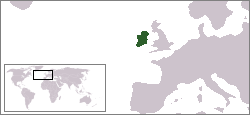Kingdom of Ireland facts for kids
Quick facts for kids
Kingdom of Ireland
Ríocht na hÉireann
|
|||||||||||||||
|---|---|---|---|---|---|---|---|---|---|---|---|---|---|---|---|
| 1541 – 1651 1659 – 1801 |
|||||||||||||||
 |
|||||||||||||||
| Capital | Dublin | ||||||||||||||
| Common languages | Irish, English | ||||||||||||||
| Government | Monarchy | ||||||||||||||
| King3 | |||||||||||||||
|
• 1542-1547
|
Henry VIII | ||||||||||||||
|
• 1760-1801
|
George III | ||||||||||||||
| Chief Secretary | |||||||||||||||
|
• 1660
|
Matthew Lock | ||||||||||||||
|
• 1798-1801
|
Viscount Castlereagh | ||||||||||||||
| Legislature | Parliament of Ireland | ||||||||||||||
| Irish House of Lords | |||||||||||||||
| Irish House of Commons | |||||||||||||||
| History | |||||||||||||||
|
• Act of Parliament
|
1541 | ||||||||||||||
| January 1 1801 | |||||||||||||||
| ISO 3166 code | IE | ||||||||||||||
|
|||||||||||||||
The Kingdom of Ireland was a country that existed from 1542 to 1800. It was closely linked to England and later to Great Britain. The same person who was King or Queen of England (and later Great Britain) also ruled Ireland. This is called a personal union.
The Kingdom of Ireland was managed from Dublin Castle. The King or Queen appointed a special leader called a viceroy (also known as the Lord Deputy or Lord Lieutenant). This person ruled Ireland on behalf of the monarch. The Kingdom had its own law-making body, called the Parliament of Ireland. It also had its own legal system and a state church, which was the Protestant Church of Ireland.
Contents
How the Kingdom Started
Before 1542, Ireland was a lordship ruled by the kings of England. This began in 1177 after the Anglo-Norman invasion of Ireland. By the 1500s, England's control over Ireland had become much smaller. Most of Ireland was controlled by Gaelic Irish leaders.
In 1542, King Henry VIII of England was made King of Ireland. This was done through a special law called the Crown of Ireland Act 1542. After this, the English began to take control of the entire island. This led to several big wars, like the Desmond Rebellions and the Nine Years’ War.
English Control and New Settlers
The English completed their control of Ireland in the 1600s. As part of this, land was taken from the native Irish people. New settlers from Britain were then moved onto this land. This process was known as the Plantations.
Early Recognition
In its early years, not all countries recognized the Kingdom of Ireland. Many Catholic countries in Europe did not accept Henry VIII or his son Edward VI as King of Ireland. However, when Queen Mary I became Queen, the Pope recognized her as Queen of Ireland.
Challenges and Conflicts
Most people in Ireland were Catholic. But the Kingdom of Ireland officially treated Catholics unfairly. From the late 1600s, Protestants held most of the power. This unfair treatment caused several conflicts and wars.
Some of these conflicts included:
- The Irish Confederate Wars (1641–1653)
- The Williamite-Jacobite War (1689–1691)
- The Armagh disturbances (1780s–1790s)
- The Irish Rebellion of 1798
End of the Kingdom
The Parliament of Ireland passed a law called the Acts of Union 1800. This law ended the Kingdom of Ireland and its own Parliament. The Parliament of Great Britain also passed the same law. On January 1, 1801, the Kingdom of Ireland and the Kingdom of Great Britain joined together. They formed a new country called the United Kingdom of Great Britain and Ireland.
Images for kids
-
Charlotte Schreiber's The Croppy Boy (1879). This painting shows a scene from the Wexford Rebellion. A man, who might be a rebel, is kneeling before a Catholic priest.
See also
 In Spanish: Reino de Irlanda para niños
In Spanish: Reino de Irlanda para niños



